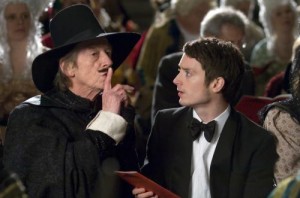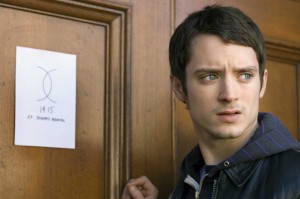The Oxford Murders
 The money is no longer in America. It used to be that you weren’t considered a success until you made it in the US, so athletes, actors, and musicians from foreign countries have been trying to make their talents more accessible (read: dumbing down) whether it be by simplifying what made them great in the first place or by conforming to a style that makes them uncomfortable and making the jump before they’re ready. This almost never works, for every Ichiro Suzuki becoming a baseball superstar, there’s ten Hideki Irabus, a bloated, overpaid flash in the pan. For every band like The Beatles practicing their wares in German clubs before emigrating, there are thirty groups like Pink Lady, which go from filling up stadiums of rabid fans to becoming short-lived variety show kitsch. For every Javier Bardem bringing his range and charm from Spanish films to his work with the Coen brothers and Woody Allen, there’s fifty Chow Yun-Fats, awkwardly trying to speak English, eliminating their substantial screen presence.
The money is no longer in America. It used to be that you weren’t considered a success until you made it in the US, so athletes, actors, and musicians from foreign countries have been trying to make their talents more accessible (read: dumbing down) whether it be by simplifying what made them great in the first place or by conforming to a style that makes them uncomfortable and making the jump before they’re ready. This almost never works, for every Ichiro Suzuki becoming a baseball superstar, there’s ten Hideki Irabus, a bloated, overpaid flash in the pan. For every band like The Beatles practicing their wares in German clubs before emigrating, there are thirty groups like Pink Lady, which go from filling up stadiums of rabid fans to becoming short-lived variety show kitsch. For every Javier Bardem bringing his range and charm from Spanish films to his work with the Coen brothers and Woody Allen, there’s fifty Chow Yun-Fats, awkwardly trying to speak English, eliminating their substantial screen presence.
 Bardem began his slow, carefully considered conversion to American star with Álex de la Iglesia’s Perdita Durango, a very violent, very 90s exploitation film shot in English. If it hadn’t been based on the same novel that David Lynch’s Wild At Heart was, calling Perdita Durango a Tarantino rip-off would seem to be a fair assessment, it’s loaded with film references (especially in the much more coherent international version), over-the-top carnage, tough talking women with an attitude (Rosie Perez), unheralded-at-the-time character actors like James Gandolfini, and it’s a road movie. Bardem smartly played it safe by still starring in mainstream Spanish films with directors like Pedro Almodovar (Live Flesh) and eventually making a full break for America with his up-to-now, final Spanish language only film, Alejandro Amenábar’s The Sea Inside, working with a director who had already had a domestic English language hit with The Others.
Bardem began his slow, carefully considered conversion to American star with Álex de la Iglesia’s Perdita Durango, a very violent, very 90s exploitation film shot in English. If it hadn’t been based on the same novel that David Lynch’s Wild At Heart was, calling Perdita Durango a Tarantino rip-off would seem to be a fair assessment, it’s loaded with film references (especially in the much more coherent international version), over-the-top carnage, tough talking women with an attitude (Rosie Perez), unheralded-at-the-time character actors like James Gandolfini, and it’s a road movie. Bardem smartly played it safe by still starring in mainstream Spanish films with directors like Pedro Almodovar (Live Flesh) and eventually making a full break for America with his up-to-now, final Spanish language only film, Alejandro Amenábar’s The Sea Inside, working with a director who had already had a domestic English language hit with The Others.
 But since Perdito Durango has only ever been available in a butchered cut in America (re-titled Dance With the Devil) and didn’t make a financial dent, de la Iglesia went back to Spain to re-invigorate his career. After the broad and sitcomy duo of Dying of Laughter and La Communidad, de la Iglesia made the maudlin and sentimental ode to faded Western stars 800 Bullets*, before finding his form again with the very funny and colorful The Perfect Crime. The Perfect Crime was much closer to the slapstick comedy and absurd violence of his first film to make a splash, the Evil Deadish** apocalyptic The Day of the Beast.
But since Perdito Durango has only ever been available in a butchered cut in America (re-titled Dance With the Devil) and didn’t make a financial dent, de la Iglesia went back to Spain to re-invigorate his career. After the broad and sitcomy duo of Dying of Laughter and La Communidad, de la Iglesia made the maudlin and sentimental ode to faded Western stars 800 Bullets*, before finding his form again with the very funny and colorful The Perfect Crime. The Perfect Crime was much closer to the slapstick comedy and absurd violence of his first film to make a splash, the Evil Deadish** apocalyptic The Day of the Beast.
Perhaps as a way to find a middle ground for his second American entrance exam, de la Iglesia’s Agatha Christie-like mystery The Oxford Murders, which was completed in 2007 (according to the end credits) but was just given a miniscule and mostly video-on-demand release by Magnolia in the US, is neither a sun drenched comedy-thriller like Perdita Durango nor an angry TV parody like Dying of Laughter. If anything it’s closer in tone to 800 Bullets, which yearned for a long-gone way of thinking. As a result, The Oxford Murders, with its cold blue color scheme and attempts at intellectualized dialogue heavy scenes is like nothing he’s made before and plays to none of his strengths.
 With a screenplay not particularly well adapted from a Guillermo Martinez novel, The Oxford Murders is the least cinematic movie de la Iglesia has made, apparently not realizing that there’s not much excitement in watching people reading or how awkward and cramped a sport like squash looks on screen. This is probably de la Iglesia’s way of “getting out of the way” of the material, but we’re left with actors like Elijah Wood and John Hurt standing around for four minutes at a time, simply giving exposition. There’s no energy to any individual scene partially because de la Iglesia brought in a lot of Spanish actors and was forced to either dub them into English or have them speak the language phonetically and because the titular murders are of characters who barely qualify as extras.
With a screenplay not particularly well adapted from a Guillermo Martinez novel, The Oxford Murders is the least cinematic movie de la Iglesia has made, apparently not realizing that there’s not much excitement in watching people reading or how awkward and cramped a sport like squash looks on screen. This is probably de la Iglesia’s way of “getting out of the way” of the material, but we’re left with actors like Elijah Wood and John Hurt standing around for four minutes at a time, simply giving exposition. There’s no energy to any individual scene partially because de la Iglesia brought in a lot of Spanish actors and was forced to either dub them into English or have them speak the language phonetically and because the titular murders are of characters who barely qualify as extras.
 The movie pretends to be about following the clues left by a serial killer trying to prove that arrogant and snooty Oxford professor John Hurt’s theories about the lack of a plan in the world and that everything is random, is incorrect. But despite de la Iglesia’s “light touch,” hence the plucky string score during the opening credits, and Hurt swimming in similar territory to one his best roles in Love and Death in Long Island (where he played a stuffy and lonely writer), The Oxford Murders is a confused mess. The fact that the confusion seems deliberate is an odd choice, keeping track of why Elijah Wood’s ambitious dreamer grad student sleeps with a busty nurse or the miserable daughter of his innkeeper, isn’t interesting, and as it turns out totally irrelevant. Wood, with his piercing Meg Foster eyes that suited him so well in Sin City, is let down by his lack of chemistry with the two women, there’s no reason they’d be interested in him, especially because he plays the role like a completely asexual slut.
The movie pretends to be about following the clues left by a serial killer trying to prove that arrogant and snooty Oxford professor John Hurt’s theories about the lack of a plan in the world and that everything is random, is incorrect. But despite de la Iglesia’s “light touch,” hence the plucky string score during the opening credits, and Hurt swimming in similar territory to one his best roles in Love and Death in Long Island (where he played a stuffy and lonely writer), The Oxford Murders is a confused mess. The fact that the confusion seems deliberate is an odd choice, keeping track of why Elijah Wood’s ambitious dreamer grad student sleeps with a busty nurse or the miserable daughter of his innkeeper, isn’t interesting, and as it turns out totally irrelevant. Wood, with his piercing Meg Foster eyes that suited him so well in Sin City, is let down by his lack of chemistry with the two women, there’s no reason they’d be interested in him, especially because he plays the role like a completely asexual slut.
 That contradiction is less embarrassing than the small and muddled role for Dominique Pinon (Delicatessen, Diva, Amelie) whose rubbery face is accidentally compared to children with down syndrome. And it’s not the only part of The Oxford Murders (which might be more accurately titled The Nerd Murders) that would be unintentionally hilarious if it weren’t so uncomfortably awkward. Burn Gorman’s role as Yuri Podorov, Wood’s jealous, drunk rival for John Hurt’s attention might qualify for a flimsy Russian caricature, but he’s further demeaned by de la Iglesia subjecting him to goofy slapstick (oh, the alcohol-drenched Russian lashes out before tripping and falling face first!) that’s an amusing diversion, while being absolutely awful.
That contradiction is less embarrassing than the small and muddled role for Dominique Pinon (Delicatessen, Diva, Amelie) whose rubbery face is accidentally compared to children with down syndrome. And it’s not the only part of The Oxford Murders (which might be more accurately titled The Nerd Murders) that would be unintentionally hilarious if it weren’t so uncomfortably awkward. Burn Gorman’s role as Yuri Podorov, Wood’s jealous, drunk rival for John Hurt’s attention might qualify for a flimsy Russian caricature, but he’s further demeaned by de la Iglesia subjecting him to goofy slapstick (oh, the alcohol-drenched Russian lashes out before tripping and falling face first!) that’s an amusing diversion, while being absolutely awful.
At least the Scooby Doo ending, requiring nearly ten minutes of explanation and negating the need to follow the previous 90 minutes is preceded by one character stating, “In life, nobody bothers explaining anything.” Well, except in this movie.
 * The same soft sentimentality that hurt the second half of his otherwise wild sci-fi parody Acción mutante.
* The same soft sentimentality that hurt the second half of his otherwise wild sci-fi parody Acción mutante.
** As perhaps an appreciative nod, Evil Dead director Sam Raimi made a reference to The Day of the Beast in Drag Me to Hell.



